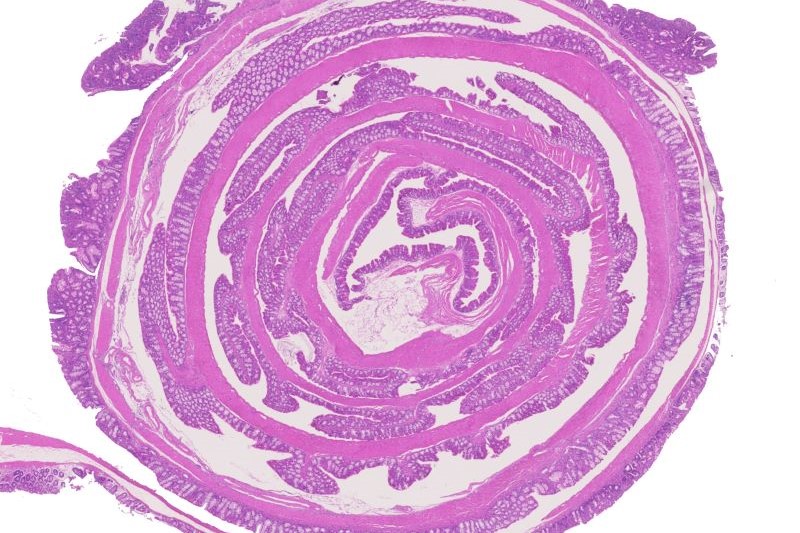Research reveals Vitamin D as potential determinant of cancer immunity and immunotherapy success
Specialist pathologist researchers from the Royal Veterinary College (RVC) – working alongside The Francis Crick Institute (FCI) and other partners – have discovered that a diet high in vitamin D encourages the growth of a type of gut bacteria in mice which improves their immunity to cancer. These findings indicate a connection between vitamin D and the immune system, suggesting how increased levels of vitamin D could also play a crucial role in cancer immunity and immunotherapy success in humans.

The research, published in Science, the world´s leading multidisciplinary scientific journal, revealed that mice showed better immune resistance to experimentally transplanted cancers when feeding them higher quantities of vitamin D, as well as improved responses to immunotherapy treatment. Similar effects were also apparent when gene editing was used to remove a protein that binds to vitamin D in the blood and keeps it away from tissues.
Essential for bones and teeth, the body produces vitamin D as a response to sun exposure. While direct sunlight is the most accessible source of vitamin D, typically between October and March in the UK, we don’t get enough sun exposure. Vitamin D can be found in a small number of foods, and supplements can be useful in helping provide the daily requirement and avoid people developing deficiencies.
Building further on the RVC’s partnership with the FCI in specialist histopathology expertise, Dr Alejandro Suarez-Bonnet and Professor Simon Priestnall of the RVC provided expert assessment of the intestine of the mice providing crucial data to support the study. This included uncovering that vitamin D acts on epithelial cells in the intestine, which in turn increases the amount of a bacteria called Bacteroides fragilis. This microbe gave mice better immunity to cancer as the transplanted tumours didn’t grow as much. Understanding how this happens is something the researchers are now exploring.
To test whether the bacteria alone could strengthen cancer immunity, mice on a normal diet were given Bacteroides fragilis. Findings indicated that these mice were more likely to resist tumour growth but not when they were placed on a vitamin D-deficient diet.
Prior studies have proposed a link between vitamin D deficiency and cancer risk in humans, although the evidence hasn’t been conclusive. To build on previous work, the researchers analysed a series of data sets and analysis of cancer patient populations, which suggested that people with low vitamin D levels were correlated with tumour development, and gene signatures of vitamin D activity were associated with improved patient responses to immunotherapy.
Although Bacteroides fragilis is also found in the microbiome in humans, more research is needed to understand whether vitamin D helps provide some immune resistance to cancer through the same mechanism.
Dr Alejandro Suarez-Bonnet, Anatomic Pathology Residency Director, and Lecturer in Comparative Pathology, at the RVC said:
“In the delicate balance of health and illness, this outstanding research has revealed the power of vitamin D to shape the immune response against tumours, illuminating new pathways for effective cancer therapies. Scientific findings like these reinforce our passion and determination to fight cancer from every front possible."

Professor Simon Priestnall, Head of Pathobiology and Population Sciences, and Professor of Veterinary Anatomic Pathology, at the RVC, said:
“This important work builds on the RVC’s reputation as a leader in experimental histopathology expertise. It also crucially demonstrates how independent in vivo assessment contributes to greater understanding of how to positively impact cancer treatments in humans. More research is now needed to give us deeper insight into the role of vitamin D but the potential possibilities we’re beginning to uncover in preventing or treating cancer is incredibly fulfilling and exciting.”
The research team comprised researchers from the RVC, the FCI, the National Cancer Institute of the U.S. National Institutes of Health and Aalborg University in Denmark.
Notes to Editors
Image caption: Mouse colon: small size, combined with careful handling and processing allows the whole mouse colon to be histopathologically assessed.
Reference
Evangelos Giampazolias , Mariana Pereira Da Costa, Khiem C. Lam, Kok Haw Jonathan Lim, Ana Cardoso, Cécile Piot, Probir Chakravarty, Sonja Blasche, Swara Patel, Adi Biram, Tomas Castro-Dopico, Michael D. Buck, Richard R. Rodrigues, Gry Juul Poulsen, Susana A. Palma-Duran, Neil C. Rogers, Maria A. Koufaki, Carlos M. Minutti, Pengbo Wang, Alexander Vdovin, Bruno Frederico, Eleanor Childs, Sonia Lee, Ben Simpson, Andrea Iseppon, Sara Omenetti, Gavin Kelly, Robert Goldstone, Emma Nye, Alejandro Suárez-Bonnet, Simon L. Priestnall, James I. Macrae, Santiago Zelenay, Kiran Raosaheb Patil, Kevin Litchfield, James C. Lee, Tine Jess, Romina S. Goldszmid, and Caetano Reis E Sousa. Vitamin D regulates microbiome-dependent cancer immunity. Science (April, 2024). https://doi.org/10.1126/science.adh7954
The full paper can be accessed here: https://www.science.org/doi/10.1126/science.adh7954
For media enquiries, please contact:
- Jasmin De Vivo at jasmin.devivo@plmr.co.uk or rvc@plmr.co.uk
- Press Line: 0800 368 9520
About the RVC
- The Royal Veterinary College (RVC) is the UK's largest and longest established independent veterinary school and is a Member Institution of the University of London.
- It is one of the few veterinary schools in the world that hold accreditations from the RCVS in the UK (with reciprocal recognition from the AVBC for Australasia, the VCI for Ireland and the SAVC for South Africa), the EAEVE in the EU, and the AVMA in the USA and Canada.
- The RVC is ranked as the top veterinary school in the world in the QS World University Rankings by subject, 2024.
- The RVC offers undergraduate and postgraduate programmes in veterinary medicine, veterinary nursing and biological sciences.
- The RVC is a research-led institution, with 88% of its research rated as internationally excellent or world class in the Research Excellence Framework 2021.
- The RVC provides animal owners and the veterinary profession with access to expert veterinary care and advice through its teaching hospitals and first opinion practices in London and Hertfordshire.
